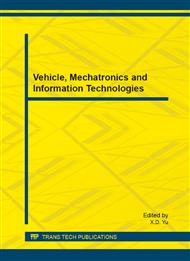[1]
S. Haykin, Cognitive radio: brain-empowered wireless communications, Selected Areas in Communications, IEEE Journal on, vol. 23, pp.201-220, (2005).
DOI: 10.1109/jsac.2004.839380
Google Scholar
[2]
Z. Qing and B. M. Sadler, A Survey of Dynamic Spectrum Access, Signal Processing Magazine, IEEE, vol. 24, pp.79-89, (2007).
DOI: 10.1109/msp.2007.361604
Google Scholar
[3]
Q. Zhao, L. Tong, and A. Swami, Decentralized cognitive mac for dynamic spectrum access, in New Frontiers in Dynamic Spectrum Access Networks, 2005. DySPAN 2005. 2005 First IEEE International Symposium on, 2005, pp.224-232.
DOI: 10.1109/dyspan.2005.1542638
Google Scholar
[4]
C. Yunxia, Z. Qing, and A. Swami, Joint Design and Separation Principle for Opportunistic Spectrum Access in the Presence of Sensing Errors, Information Theory, IEEE Transactions on, vol. 54, pp.2053-2071, (2008).
DOI: 10.1109/tit.2008.920248
Google Scholar
[5]
S. H. A. Ahmad, M. Y. Liu, T. Javidi, Q. Zhao, and B. Krishnamachari, Optimality of Myopic Sensing in Multichannel Opportunistic Access, Ieee Transactions on Information Theory, vol. 55, pp.4040-4050, Sep (2009).
DOI: 10.1109/tit.2009.2025561
Google Scholar
[6]
Y. X. Chen, Q. Zhao, and A. Swami, Distributed Spectrum Sensing and Access in Cognitive Radio Networks With Energy Constraint, Ieee Transactions on Signal Processing, vol. 57, pp.783-797, Feb (2009).
DOI: 10.1109/tsp.2008.2007928
Google Scholar
[7]
B. B. Wang, Z. Ji, K. J. R. Liu, and T. C. Clancy, Primary-Prioritized Markov Approach for Dynamic Spectrum Allocation, Ieee Transactions on Wireless Communications, vol. 8, pp.1854-1865, Apr (2009).
DOI: 10.1109/t-wc.2008.080031
Google Scholar
[8]
Y. H. Xu, J. L. Wang, Q. H. Wu, A. Anpalagan, and Y. D. Yao, Opportunistic Spectrum Access in Unknown Dynamic Environment: A Game-Theoretic Stochastic Learning Solution, Ieee Transactions on Wireless Communications, vol. 11, pp.1380-1391, Apr (2012).
DOI: 10.1109/twc.2012.020812.110025
Google Scholar
[9]
A. Gosavi, Reinforcement Learning: A Tutorial Survey and Recent Advances, Informs Journal on Computing, vol. 21, pp.178-192, Spr (2009).
DOI: 10.1287/ijoc.1080.0305
Google Scholar
[10]
A. Weissensteiner, A Q-Learning Approach to Derive Optimal Consumption and Investment Strategies, IEEE Transactions on Neural Networks, vol. 20, pp.1234-1243, Aug (2009).
DOI: 10.1109/tnn.2009.2020850
Google Scholar


